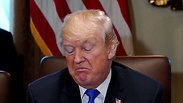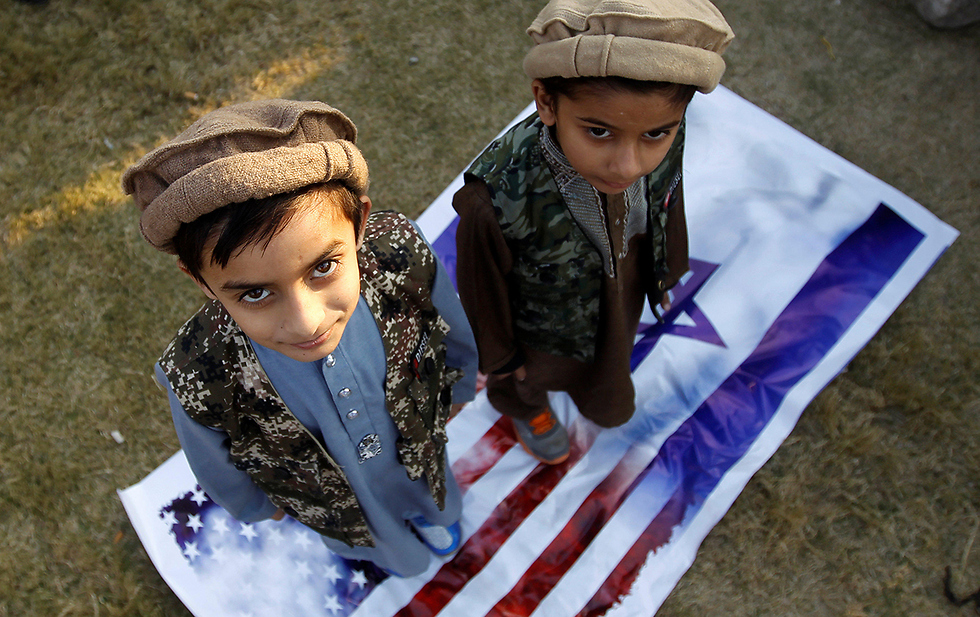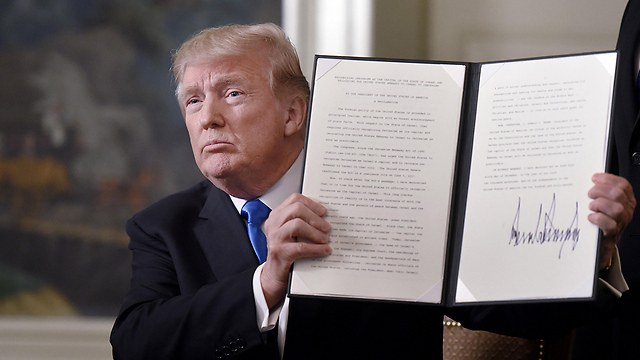
How Trump embarrassed Israel with anti-Palestinian tweet
Analysis: In his threat to cut aid to the Palestinians, the US president implied that Israel would be taxed for his Jerusalem declaration one way or another; but if Trump has been so successful in getting Netanyahu to make concessions for a future agreement, why isn’t he presenting them—if not in public, then at least to the Palestinians?
When all eyes in Ramallah and in Jerusalem, in Riyadh and in Amman, are on Washington, and there is a desire to understand what Donald Trump intends on offering or imposing on the Middle East—if at all—to reach a state of calm ahead of a reconciliation, an American president's word could be decisive.
Moreover, when the Iranian people have launched an uprising and the ayatollah regime is building outposts on Israel’s border and keeps supporting Hezbollah as well as Hamas, an American president’s word could be decisive.
But Donald Trump hasn’t proved thus far that he is capable of presenting a proper diplomatic doctrine or that he is capable of coming up with a plan that has a beginning, a middle and an end, with lines of action and a timetable.
He outdid himself last week: After US Ambassador to the UN Nikki Haley announced America’s intention to halt funding to the United Nations Relief and Works Agency (UNRWA), the agency tasked with assisting Palestinian refugees, the president left many people speechless with his tweet about the Palestinians and Jerusalem: “We have taken Jerusalem, the toughest part of the negotiation, off the table, but Israel, for that, would have had to pay more,” he wrote after stating that Pakistan is not the only country that “we pay billions of dollars to for nothing” and that the US pays "the Palestinians HUNDRED OF MILLIONS OF DOLLARS a year” and gets “no appreciation or respect."
Does he plan on halting aid to UNRWA, as Haley said, or does he also want to cut the American aid to the Palestinian Authority? That’s unclear. Put simply, what Trump likely wanted to say in his tweet was: “You ungrateful Palestinians are receiving a fortune from us, and not only have you no respect for us, but you have no appreciation as well. So the party’s over, and Uncle Sam is closing his wallet.
“And look at how you keep living up to your reputation as people who don’t miss an opportunity to miss an opportunity: I declared Jerusalem as Israel’s capital, but you failed to understand the importance of this move. I did it so that Israel would make concessions towards you, ones you never would have dreamed of. I gave Israel a few words about Jerusalem, and had you only realized the greatness of that moment, you would have jumped on the negotiation bandwagon and received concessions that only I could get Israel to make, because I’m the one who recognized Jerusalem.”
No such thing as a free lunch
Trump used the same opportunity to indicate to Israel, implicitly and vaguely, that his declaration carries a price—and that it wasn’t born, as the White House said, because Trump thinks it’s a moral move. No, Israel will be charged for this one way or another.
That’s what was hiding between the lines of Trump’s strange tweet about the Palestinians and Jerusalem, and that’s what made so many people around the Middle East and the entire world wonder: If Trump has concessions from Israel, why isn’t he presenting them—if not in public, then at least to the Palestinians?
If he has been so successful in getting Prime Minister Benjamin Netanyahu to make concessions for a future agreement, why isn’t he starting the negotiations from this point? He could have slightly reduced the Palestinian anger over the declaration. And he also embarrassed Israel, revealing that there’s no such thing as a free lunch on his watch and that Israel was willing to pay.
Donald Trump has a plan to solve the conflict. He hasn’t invented anything. The plan, which is pretty general, is based on elements of the Saudi initiative, which has been ratified by the Arab League more than once. Trump likes to boast that he has a special and efficient relationship with the royal family in Riyadh and has implied time and again that he will not only bring about peace between Israel and the Palestinians, but also a reconciliation with all Arab states, including Saudi Arabia, which hasn’t made one goodwill gesture and even refused to reward Trump by providing Israeli chess players with the visas they needed to attend an international tournament, although the president really tried to get them to do so through his assistants.
An unfulfilled promise
On January 20, Trump will mark one year in office. So far, he has failed to present a single diplomatic achievement or an improvement in one of the urgent foreign affairs. He threatened North Korea on Twitter last week, stating that he had a bigger and more powerful "nuclear button" than North Korean leader Kim Jong Un and that “and my Button works!"
American experts, some from the State Department, said it was the most dangerous tweet released by Trump so far. Former Vice President Joe Biden, who has kept quiet since leaving the White House, said in response to Trump’s tweet: “This is not a game.”

Then Trump promised—once again, in a tweet—to help the Iranian protestors, despite all expert opinions that the US would only harm the rebels by supporting them.
The tensions with North Korea are alarming, Iran’s entrenchment in Syria is terrifying, and the way things look now, all of Trump’s promises to bring about a glorious peace deal between Israel and the Palestinians are false promises. And this was a key election promise. He even let his closest associate—his son-in-law and senior advisor, Jared Kushner—lead the move.
He hasn’t kept his other election promises either (apart from signing the Tax Cuts and Jobs Act), and it now seems—more than ever—that the Middle East and its troubles are drifting away from the White House and its leader.
All three previous presidents—Bill Clinton, George W. Bush and Barack Obama—made a serious and committed effort to bring the parties closer together, each in his own way. Trump has failed to make a single significant positive move in that direction, and he could have done much more than his predecessors, as both the Israelis and the Palestinians had faith in him the minute he took office. In his first days in office, the Palestinians saw him as someone they could get somewhere with—until the Jerusalem declaration and the vague threat to cut US aid.












